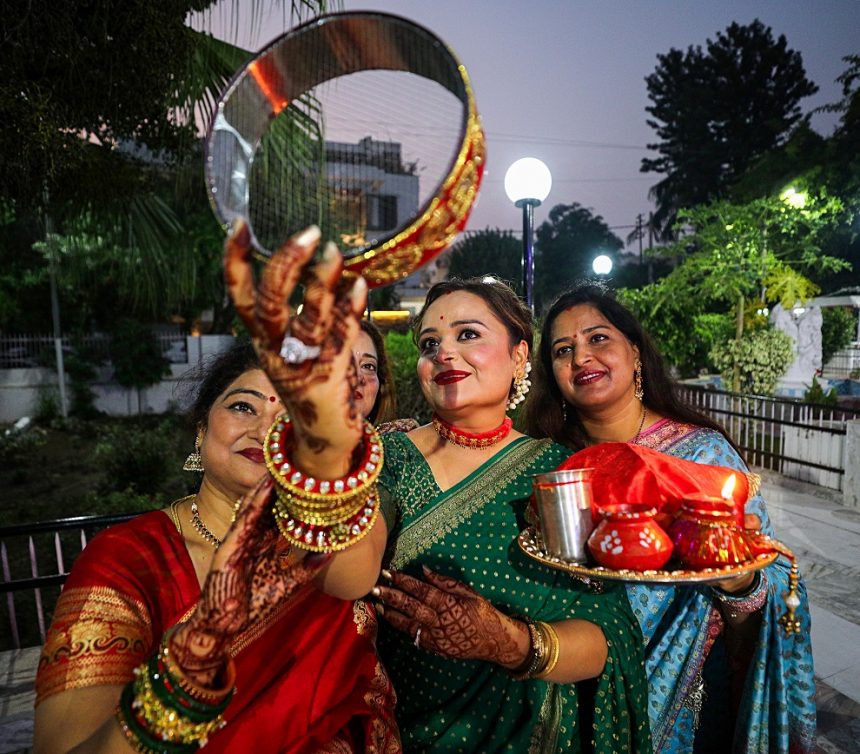The ritual of Karva Chauth—a day when women fast from dawn to moonrise for the longevity of their husbands—has been observed by many Hindu communities across India for centuries. However, among the Kashmiri Pandits, this tradition is conspicuously absent. Instead, their approach to marriage is steeped in the deep philosophical tenets of Vedic rites, emphasizing a sacred union based on equality. The roots of this divergence lie in ancient traditions, where spiritual unity, rather than ritualistic sacrifice, stands as the pillar of their marital relationship.
The Vedic Foundations: Saptapadi and the Concept of Ardhanarishvara
In the Kashmiri Pandit tradition, marriage is not merely a social contract; it is a spiritual bond grounded in the highest Vedic principles. The defining feature of a Vedic marriage is the ritual of Saptapadi, the seven steps taken by the bride and groom around the sacred fire. These seven steps symbolize a shared journey—partnership in dharma, artha (prosperity), and kama (desires), with the couple vowing to be one another’s equal companions through the many phases of life.
A pivotal moment during the marriage ceremony comes when the father of the bride recites the profound verse, ‘I give my daughter to you, the Om’. Here, the groom is not seen as a mere man, but as the embodiment of Shiva, the infinite divine consciousness. In this cosmic union, the bride represents Shakti, the creative energy, and together they merge to form the Ardhanarishvara, the perfect balance of male and female energies. The idea of Ardhanarishvara, where Shiva and Shakti are equal halves of a unified whole, forms the philosophical bedrock of the Kashmiri Pandit understanding of marriage. The couple is seen as spiritually complete, each contributing equally to the other’s growth, well-being, and life journey.
This sacred belief that husband and wife are halves of the same soul is what distinguishes the Kashmiri Pandit marriage philosophy from other traditions. The Posh Puja, an important post-marriage ritual, celebrates this very concept. The couple is adorned with flowers and invoked as divine beings, symbolizing the union of Shiva and Shakti. This ritual reinforces the notion of equality between the spouses—both revered equally as integral parts of one whole. The underlying message is clear: there is no hierarchical dominance or submission in this bond. Both are mutually responsible for each other’s well-being and happiness.
The Philosophical Rejection of Karva Chauth: A Tradition of Equality
Given this spiritual equality, Kashmiri Pandit women do not observe Karva Chauth. In many communities, Karva Chauth is a day of fasting and prayer where women, out of devotion, sacrifice food and water for the longevity of their husbands. This ritual, while revered, assumes an inherent imbalance where the wife is the supplicant and the husband the recipient of her prayer and sacrifice.
In Kashmiri Pandit thought, this notion is fundamentally at odds with the spiritual principles of marriage. The equality established during Saptapadi—the seven steps taken in union—ensures that neither partner is seen as subordinate or dependent. Instead of fasting for her husband’s well-being, the Kashmiri Pandit wife is seen as an equal contributor to the relationship, just as the husband is to her. There is no necessity for one-sided rituals where one partner sacrifices for the other; instead, the couple walks side by side, sharing equal responsibility for each other’s health, happiness, and spiritual growth.
This mutual respect and balanced relationship stems from the very foundation of Kashmiri Shaivism, which emphasizes that all beings are manifestations of the divine. In such a worldview, both the husband and wife are reflections of the same cosmic energy, neither above nor below the other. Just as Shiva and Shakti are incomplete without one another, so too are husband and wife seen as two parts of a unified divine whole. The responsibility for each other’s well-being lies equally with both, making rituals like Karva Chauth redundant in this context.
The Sacred Feminine: A Different Approach to Marital Rituals
Kashmiri Pandit culture has long revered the sacred feminine—the idea that the woman is not just a nurturer or protector but the embodiment of divine energy itself. This belief has influenced their customs and rituals, where the focus is on mutual respect, understanding, and partnership.
In Kashmiri Shaivism, Shakti is not a passive force but an active, dynamic energy without which Shiva is powerless. This understanding permeates the Kashmiri Pandit worldview, where the wife is seen not as a mere companion but as an equal force in the relationship. Posh Puja, where the couple is adorned and worshipped as divine beings, serves as a beautiful reminder of this concept. By equating the couple with Shiva and Shakti, the ritual underscores their equal standing in the relationship.
Kashmiri Pandit women, who embody this sacred feminine, do not observe Karva Chauth because their relationship with their husbands is not predicated on dependence or one-sided protection. Instead, both partners are seen as protectors of each other, nourishing their relationship through equal effort, love, and spiritual practice.
The Eternal Bond: Living the Philosophy of Equality
While fasting and prayer in some traditions are seen as ways to secure the husband’s longevity, Kashmiri Pandit philosophy promotes the idea that true longevity in marriage comes from understanding, mutual respect, and spiritual connection. The couple, united as Ardhanarishvara, seeks blessings not through one-sided rituals but through shared responsibilities, devotion, and love.
The Kashmiri Pandit woman thus embodies a unique strength—she is part of an ancient tradition that views her not as subservient but as an equal partner in all aspects of life. Her role is not to fast for her husband but to walk beside him as his equal in both spiritual and material journeys. This approach to marriage is a reflection of the broader Kashmiri Shaivite philosophy, where life is seen as a union of dualities—light and dark, male and female, spirit and matter—and it is through the balance of these forces that one attains true fulfillment.
A Union of Equals in the Divine Realm
In the Kashmiri Pandit tradition, the non-observance of Karva Chauth is not merely a deviation from mainstream Hindu practices but a powerful affirmation of their deeply spiritual and philosophical worldview. The sacred union between husband and wife, rooted in the concept of Ardhanarishvara, transcends rituals that imply imbalance or dependence. The Posh Puja, Saptapadi, and the overall marriage philosophy of the Kashmiri Pandits are built upon the idea of mutual respect, equality, and spiritual partnership.
In this divine framework, the wife does not need to fast or pray for her husband’s longevity because their bond is inherently equal and sacred. Just as Shiva is incomplete without Shakti, and vice versa, the husband and wife in a Kashmiri Pandit marriage are inseparable parts of a divine whole. Their relationship thrives not on sacrifice but on shared responsibility, love, and spiritual harmony.
Thus, the Kashmiri Pandit woman stands as a testament to the enduring power of equality and divine partnership in marriage, offering a timeless lesson in mutual respect and spiritual unity to the world.
(Author is a columnist and can be reached at: [email protected])








